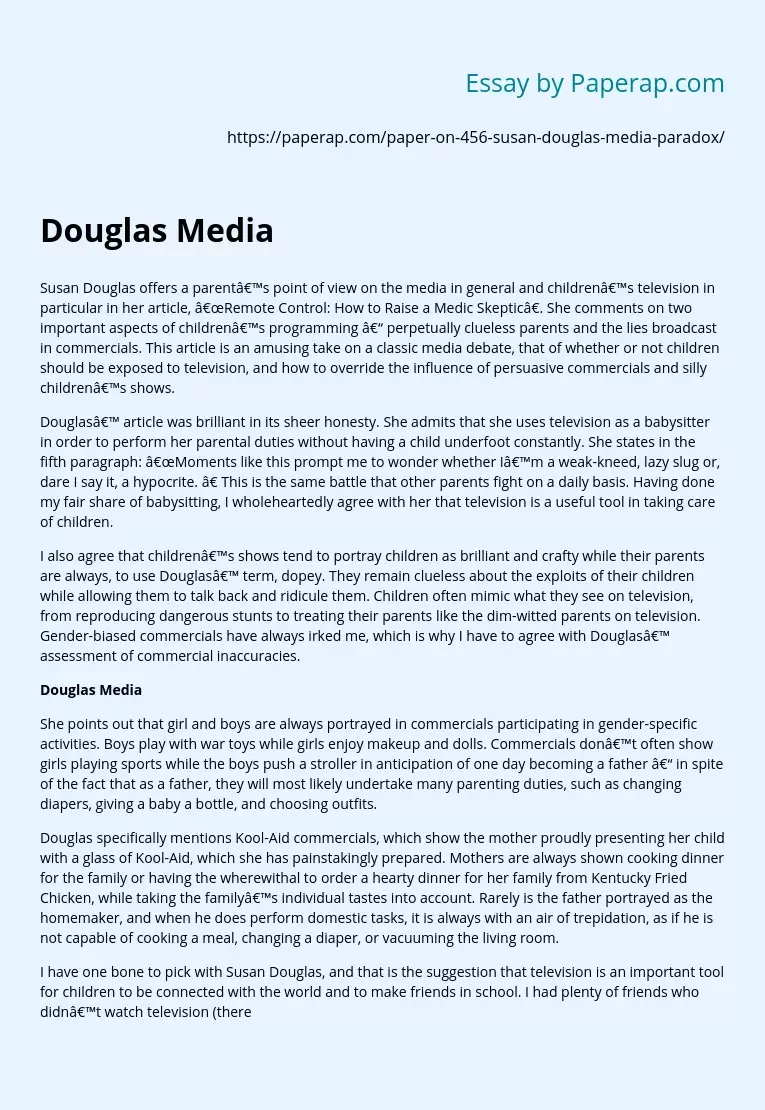Media Critique from a Parent's Perspective
The following sample essay on Douglas Media as a history of classic media.
Susan Douglas offers a parent’s point of view on the media in general and children’s television in particular in her article, “Remote Control: How to Raise a Medic Skeptic”. She comments on two important aspects of children’s programming – perpetually clueless parents and the lies broadcast in commercials. This article is an amusing take on a classic media debate, that of whether or not children should be exposed to television, and how to override the influence of persuasive commercials and silly children’s shows.
Douglas’ article was brilliant in its sheer honesty. She admits that she uses television as a babysitter in order to perform her parental duties without having a child underfoot constantly. She states in the fifth paragraph: “Moments like this prompt me to wonder whether I’m a weak-kneed, lazy slug or, dare I say it, a hypocrite. ” This is the same battle that other parents fight on a daily basis.
Having done my fair share of babysitting, I wholeheartedly agree with her that television is a useful tool in taking care of children.
I also agree that children’s shows tend to portray children as brilliant and crafty while their parents are always, to use Douglas’ term, dopey. They remain clueless about the exploits of their children while allowing them to talk back and ridicule them. Children often mimic what they see on television, from reproducing dangerous stunts to treating their parents like the dim-witted parents on television.
Gender-biased commercials have always irked me, which is why I have to agree with Douglas’ assessment of commercial inaccuracies.
She points out that girl and boys are always portrayed in commercials participating in gender-specific activities. Boys play with war toys while girls enjoy makeup and dolls. Commercials don’t often show girls playing sports while the boys push a stroller in anticipation of one day becoming a father – in spite of the fact that as a father, they will most likely undertake many parenting duties, such as changing diapers, giving a baby a bottle, and choosing outfits.
Douglas specifically mentions Kool-Aid commercials, which show the mother proudly presenting her child with a glass of Kool-Aid, which she has painstakingly prepared. Mothers are always shown cooking dinner for the family or having the wherewithal to order a hearty dinner for her family from Kentucky Fried Chicken, while taking the family’s individual tastes into account. Rarely is the father portrayed as the homemaker, and when he does perform domestic tasks, it is always with an air of trepidation, as if he is not capable of cooking a meal, changing a diaper, or vacuuming the living room.
I have one bone to pick with Susan Douglas, and that is the suggestion that television is an important tool for children to be connected with the world and to make friends in school. I had plenty of friends who didn’t watch television (there was a large Mormon population in my town and they were opposed to all television programming) and it never kept us from having common ground. If Douglas is so convinced that television is a toxic waste dump, she could simply find other ways for her daughter to remain connected with the world.
Newspapers can provide information on world and local events as well as entertainment news, while other information can be accessed online. Television isn’t truly a “must-have”. Douglas is honest about the fact that she, too, doesn’t want to give up television, and that is most likely the real reason that there is still television in her home. It is possible that Douglas has bought in to the idea that children have the last word in the home, as they often do on television.
My last criticism of Douglas’ method of introducing television in the home is using the word “stupid” to describe what she sees in certain programs. Rather than emphasizing the negative, she should reinforce positive ideas, such as explaining to her daughter that Lassie isn’t really smarter than the parents, but they are portrayed that way because the show is about Lassie. If the show was about the parents, then the parents would be the smart characters. If I were to write an article that was similar to Douglas’, I would first comment on how certain groups are stereotyped on television.
Female teachers are often “cougars”, seducing their young male students, while teachers in general are accused of being uncaring and unqualified, even though No Child Left Behind made certain that there would be no more unqualified teachers in classrooms. Police officers are always shown as corrupt individuals who steal drug money and beat up suspects. Every time a postal worker turns violently against his co-workers, the news media will do an entire series on the phenomena of postal rage, as if every postal worker has the capacity for violence.
These portrayals are disturbing, as those three occupations are often inhabited by low-paid, earnest adults. In conclusion, Susan Douglas presents a humorous, witty account of what it is like to be a parent in a society that is consumed by different media influences. I agree that it is important to teach children how to watch television, and to present them with the fallacies that are inherently pervasive in children’s programming. My final suggestion is that Douglas ask older people how they kept their own children occupied before the invention of television.
Media Critique from a Parent's Perspective. (2019, Dec 05). Retrieved from https://paperap.com/paper-on-456-susan-douglas-media-paradox/

